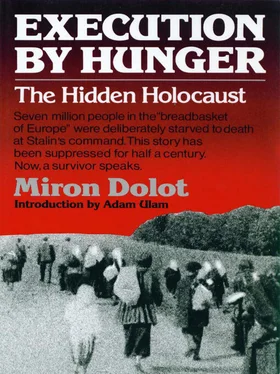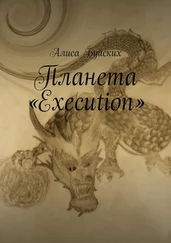“You’ll have to wait your turn in lines,” he continued. “The first ones to receive the meal will be those who are able to work in the field.” Saying this, he stepped down from the tractor and took his place by the kettles to supervise the distribution of the food.
Slowly order was restored. The hungry ones were properly lined up. Some were standing; some lying in their waiting lines, all holding food containers: bowls, pots, and cans. Comrade Thousander nodded benevolently, signaling the May Day meal to begin. Each person received two large scoops of buckwheat porridge. No one was forgotten or omitted.
After the meal was finished, Comrade Thousander mounted the tractor again to make an important announcement. From now on, he said, the members of the collective farm who worked in the field would receive a pound of bread, and two hot meals daily. Then he ordered those who were able to go immediately to the field and start working.
There were not many who left for the fields. The buckwheat porridge could not perform miracles. Many were too weak to walk for a longer distance, or even get up. They remained sitting or lying in the square, licking the remainder of the porridge from their containers.
We, the pupils, and our teachers, were the last ones to receive our portions of the porridge. While the hungry crowds were gulping their shares, we had to sing patriotic May Day songs, thanking the Communist Party and the Soviet government for granting us a happy and prosperous life. All the while we endured the hunger pangs torturing us and envied those who were already eating their porridge.
The man shot and killed on the tractor was dragged away from the place where he had fallen and left lying in the square in open view. I noticed after a while that a starving dog approached him, and after some careful sniffing, started licking the blood off his wound.
THE BATTLE for the Ukrainian wheat crop of 1932 started almost two months before the harvest.
At the end of May, some strangers appeared in our village, and little by little, we began finding out who they were. The Party had mobilized 112,000 of its most active and reliable members in order to organize a speedy harvest of the new crop, and to secure its swift and smooth requisitioning and final delivery to the State. Soon these members became known to us as the Hundred Thousanders, or just Thousanders. There were nine of them in our village, one for each Hundred, and one who was to become the village Thousander: the leader of the entire group. The former Thousander, Comrade Cherepin, along with his entourage, were transferred to another village. In no time at all, these new Thousanders took over our entire village like tyrants, imposing their wills and their demands upon us.
The name of our new village Thousander was Livshitz. We called him Comrade Livshitz, or simply Comrade Thousander. Nobody knew where he came from, but it must have been one of the big cities. He had urban manners, and although he spoke broken Ukrainian, he tried to speak in a polished and polite way. His hair was dark, with no signs of graying, although he must have been in his fifties, and he was of average height. We believed he was married for he wore a plain gold band on his finger, but we heard nothing about his wife or family. He was a typical town dweller; there was nothing unusual in his appearance. However, the look in his eyes, and the way he talked to us betrayed his hatred toward us, the people over whom he was to rule.
Comrade Livshitz and his colleagues assumed their authority in the village without delay. The next day we heard that they had reinstated the village administrative system established by Comrade Zeitlin, our first Thousander in 1930. We were again caught in the meshes of the administrative units of Hundreds, Tens, and Fives. Again, we were subjected to endless meetings and sickening propaganda speeches. Once more we were forced to participate in “socialist competition” between those administrative units. We had to resume “path-treading,” this time for not turning in “hidden hoards” of food and so forth.
The new Thousander, in addition to regular secret informers of the GPU, established a spy network which was very naive, but at the same time very effective. This was the network of silkors , or village correspondents. The spy network was organized as follows: ordinary villagers, usually members of the Young Communist League and schoolchildren, were appointed by the village Party organization, or by the Thousander personally, to act as reporters. The ostensible purpose of their contributions to the press was to report about what was going on in the village. But, in reality, these silkors were instructed to look for traitors and saboteurs. They were particularly instructed to denounce those villagers who were hiding foodstuffs from the state, and those, who in one way or another, demonstrated hostility toward the Party and the government. In other words, they were taught to spy on their fellow villagers, and then report their findings and observations to the local newspaper. What these silkors did not know was that their reports were passed on to the appropriate government agencies, usually to the GPU and militia. If a given report seemed to contain some worthwhile information, a GPU agent or a militiaman would be dispatched to the village to investigate the matter further.
Thus the stage was set for a new drama to be performed by a new cast under the directorship of the new Thousander. A prelude to this drama took place in our neighborhood: it was the eviction of Stepan Shevchenko from his house.
Stepan was a poor farmer. He had a nice family consisting of his wife and two children: a boy of nine and a girl of seven. They were all healthy and seemed to be content with their lot. Although he was a poor farmer like the rest of us, Shevchenko differed from us in one way: he had categorically refused to join the collective farm, and what was most amazing to us, he somehow managed to survive in spite of it, or so it seemed, until June 1932.
He paid off all his taxes in kind and money for the year 1932, and apparently thought that the government would leave him alone, at least for a while. But he was overly optimistic.
One day, he received a requisition order demanding him to deliver 500 kilograms of wheat to the state. He delivered it in full. But no sooner had he done so when he received another order. This time they demanded twice as much wheat, something they knew he could not deliver because he had none left. His explanations were of no avail. The officials persisted and threatened him with Siberia. He knew that they meant it, so he was forced to sell everything he had of value, including his cow, to buy the order of wheat. He naively believed that now his troubles were over. Yet his fate had been sealed when he refused to join the collective farm. The demands of impossibly high quotas of grain were only excuses for ruining him. Sure enough, he soon received the inexorable third order: 2,000 kilograms of wheat immediately! This he could not do. He had nothing more of value to sell with which to buy any more grain. He and his family were already left destitute.
One fateful day, the Bread Procurement Commission paid him a visit. They searched his premises for hidden grain, but found nothing. Nevertheless, he was labeled a kurkul, and he and his family were ordered to leave their house immediately. The house and all that belonged to the Shevchenkos was confiscated and was to be turned into “socialist property.” Upon hearing this proclamation, Shevchenko and his family put up a desperate struggle. Their cries and screams and the shouting of the officials attracted our attention. My brother and I ran there to see what was going on.
Читать дальше












